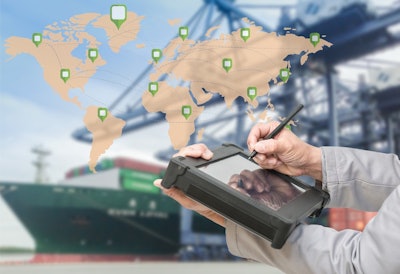
GPS technology has been at the forefront of technological developments for the past decade. Following the innovations in the field, business industries quickly embraced the countless benefits of GPS-based technologies such as insurance-approved GPS trackers and fleet management systems. The idea of managing long-range logistics operations have completely changed with the advent of GPS technology and its applications. Fleet management systems grant access to mission-critical information such as real-time location, speed, temperature, humidity and other details related to the field operations. Coupled with a cutting-edge software, this information paves the way for complex management systems that can generate comprehensive reports and perform analysis on employees, vehicles and machinery to improve the efficiency of businesses exponentially.
Business operations that involve transportation of goods have been a logistical nightmare for decades due to their longevity and lack of information, but it is a thing of the past now. On-demand access to location and operational data improves the decision-making process drastically and allows executives to make last-minute changes on-the-go. These modern systems may seem too good to be true for business owners and managers, but it is all possible thanks to the information that GPS technology provides. Let’s take a look how GPS impacts tracking process of business operations and the advantages this revolutionary technology offer for companies all over the world.
Productivity
Increasing revenue is always the top priority for businesses, however, achieving it is easier said than done. For a company to generate more revenue, they need to complete more job orders in a workday and use the most efficient routes for their deliveries. The same principle applies to international shipments as well and large enterprises were among the first businesses to adopt modern GPS systems as they are essential in creating policies to increase their productivity. Having access to real-time location and actionable accurate data can be used to redirect vehicles and employees to customers in need while using the shortest route to their target. Not only can businesses create more opportunities to generate more income with GPS tracking systems, but they can also lower their operational costs as well.
Resource optimization
Transporting large amounts of goods over long distances require tremendous amounts of resources. Without proper resource optimisation, transport operations can be less profitable than they are or even make a company lose money in the long term if the necessary measures aren’t taken. Drivers, vehicles, fuel, loading/unloading times and many more factors come into effect when planning logistics operations and GPS tracking systems can increase operational efficiency to the highest level with constant data updates. By careful planning and the utilisation of GPS-based applications, enterprises can lower their resource consumption and use their manpower optimally to increase overall productivity and efficiency.
Employee monitoring
Vehicle tracking devices are designed to collect data about the driving habits of drivers as well as the movements of employees during their work hours. Problems like unauthorised vehicle use, inefficient use of job hours and idling are well-known issues for companies who conduct long-range transportation operations. Simply by integrating GPS-based management systems to their infrastructure, businesses gain complete control over their operations; managers can access individual driver behaviour reports and travel history which are both crucial in determining any misuse of company vehicles and waste of operational resources. Employee monitoring only made possible with the flow of information GPS tracking devices provide; companies can save significant amounts of money on fuel, maintenance expenses and increase their productivity by tracking the behaviour of their employees during work hours.
Customer relations
There are different aspects to transportation and logistics operations and not all freight is carried by trucks; international shipping companies use trains and ships to transport large shipments and maintaining the information flow is crucial for this type of operations. Due to the technological age we live in, customers demand more information about their shipments every day and they want to stay informed about every little change in the condition of their cargo to accommodate for any changes in the condition of their cargo or the delivery schedules. Field managers can track the location of their shipments even in the middle of the ocean with advanced GPS trackers such as satellite tracking devices and keep their business partners updated every step of the way. This will lead to increased customer retention and generate additional customers due to the improved quality of service.
Conclusion
Running a business regardless of its size or industry is costly and complicated. Operational challenges of transport and logistics companies are more demanding compared to other industries but that doesn’t mean they can’t be overcome. With the help of advanced systems like GPS tracking systems, shipments can be tracked from thousands of miles away, employees can be directed around congested traffic points or unruly drivers can be warned for their risky behaviour. Fleet management systems essentially reshape how businesses operate; for the transport and logistics industry, GPS technology has been a boon since its introduction with the powerful tools and advanced features they bring to the table. GPS-based fleet management systems can help lower operational and administrative costs, provide a significant boost to productivity and help tremendously in the event of an emergency. These sophisticated systems are actually a profitable investment that provides a quick ROI and increase operational efficiency.


















